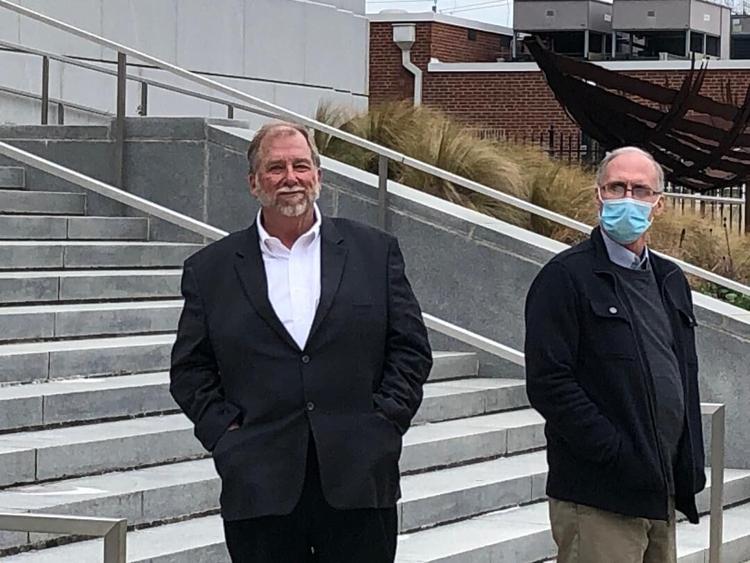Forensic Investigator Helps Uncover 6 Year Embezzlement Scheme
MOBILE, Ala. (WALA) – Alexander Paul Fleming wasn’t just an employee of G.C. Specialties in Mobile. He was like a family member of the owner.
Minority owner Steve Whitworth was Fleming’s godfather and best friend of Fleming’s father for nearly five decades, according to Whitworth’s wife, Lucy Whitworth.
So it was inconceivable, she said Wednesday, that Fleming would steal nearly three quarters of $1 million – a fraud so vast that it nearly wiped out the business.
Steve Whitworth (left) stands outside the federal courthouse in Mobile, Alabama, on Wednesday, Feb. 17, 2021. Whitworth is minority owner of G.C. Specialties, a company that lost $715,000 in a wire fraud case perpetrated by a employee and longtime family friend. (Brendan Kirby/FOX10 News)
“Steve and I have had our hearts broken and shattered into a million pieces,” Whitworth told Senior U.S. District Judge Ginny Granade at Fleming’s sentencing hearing. “We have struggled to understand how Alex has chosen to steal from people who loved him like a son and have come to the conclusion that we probably will never know.”
Whitworth added that her husband has had panic attacks since the embezzlement came to light and that it has damaged the future of the business and forced her and her husband to delay retirement.
Granade sentenced Fleming, 34, to two years and nine in prison for wire fraud. She rejected a request by defense attorney Kenyen Brown to depart downward from the prison range set forth by advisory sentencing guidelines. He argued that an undiagnosed mental illness contributed to his client’s impulsiveness.
“It’s very hard to determine why you did this, Mr. Fleming,” she said.
She added: “The mental illness did not plant within your mind the desire to do this. … The fact is, you are a thief.”
According to the written plea agreement, Fleming in 2001 went to work as a project manager at G.C. Specialties, an architectural specialty contractor. He admitted that from April 2014 to February of last year, he devised a scheme to defraud the company by creating fake vendor email accounts in the name of real vendors. He also created a fake PayPal account with multiple fake electronic alter egos under the names Raymond Miller, Dustin Yeager and John Edge.
According to the plea document, Fleming created fraudulent invoices to G.C. Specialties in the names of real vendors and then assigned them to the company’s projects. He used the fake vendor email accounts to send fraudulent invoices to his company and the fake PayPal accounts to request payment.
Finally, the document states, Fleming used his position at the company pay the invoices with the firm’s American Express card. Then Fleming would move the money to his own personal bank account, according to the plea agreement.
To cover his tracks, Fleming periodically would create fake delivery receipts and other documents, the plea agreement states.
Court records indicate that Fleming submitted 75 fake invoices totaling about $650,540. In addition, he admitted that he used the company credit card to purchase items on Amazon.com for his personal use. Some $97,563 in embezzled funds went to pay the mortgage of his home in Theodore, according to the plea agreement.
For his part, Fleming pronounced himself “ashamed,” “repentant” and “humble.” He told the judge he wants to do whatever it takes to make amends. He said his humiliation led to a suicide attempt last March.
“Despite all these questions I still have about myself, that doesn’t change why we are here today,” he said. “In such a short period of time, I damaged some relationships that it took literally a lifetime to build.”
Brown argued for a sentence of six months imprisonment, followed by three months of home confinement. He submitted 17 character letters on Fleming’s behalf, including from his former football coach at St. Paul’s Episcopal School.
Brown argued that his client suffered from an undiagnosed bipolar disorder and took medication prescribed for attention deficit hyperactivity disorder – drugs that the lawyer said only exacerbated Fleming’s condition.
“He has struggled with mental health issues since he was in college,” Brown told Granade. “He has sought treatment for those issues. Through no fault of his own, he was misdiagnosed.”
Brown noted that friends and family helped Fleming raise $200,000 toward the $715,000 in restitution that he owes. In exchange, prosecutors have agreed not to try to seize his house.
Assistant U.S. Attorney Vicki Davis argued that leniency was not appropriate. She noted that far from an impulse crime, the defendant’s “various and sundry schemes” played out over almost six years.
“The schemes as detailed were very involved. … That’s a long time to be impulsive,” she said.
Davis also referenced allegations that Fleming embezzled from an employer in Tuscaloosa after graduating from the University of Alabama but before moving back to Mobile. She said Fleming’s parents paid the company and that it did not result in criminal charges.
Brown objected that those were “unsubstantiated allegations” and that it was unfair to consider them. Granade said she would not take those into account but had no reason to give a sentence more lenient that what the guidelines recommend.
“I consider myself to have been merciful in that I didn’t sentence him to the high end of the guidelines,” she said.


Recent Comments